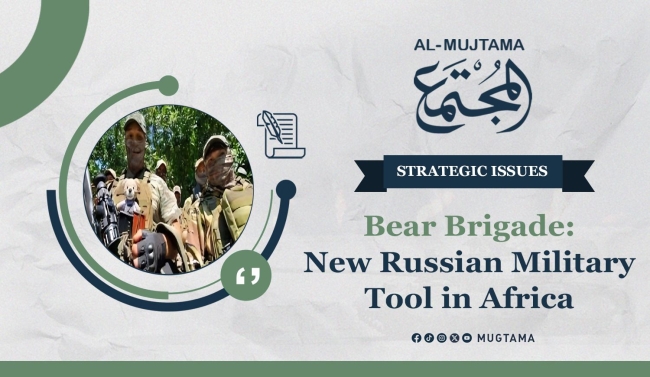Bear Brigade: New Russian Military Tool in Africa Featured
The Bear Brigade, a semi-military Russian unit, was first deployed in West Africa to support local councils and expand Russia's geopolitical influence. Following the decline of the Wagner Group, the Bear Brigade aligns with Moscow's goal to exert influence in Africa while addressing gaps left by Western countries, especially France. The Brigade functions as a more formal unit under Russian military supervision, focusing on securing regimes that have severed ties with their Western allies.
The formation and structure of the Bear Brigade include former combatants from the conflict in Ukraine and former special forces operatives, reflecting the Brigade's distinguished military experience. The operations of the Bear Brigade in Burkina Faso, Mali, and Niger focus on securing regimes that have severed ties with their Western allies and acting as a force multiplier for local armies and contributing to counter-insurgency efforts.
One of the key roles of the Bear Brigade in Africa is protecting military council leaders, such as Captain Ibrahim Traore of Burkina Faso, by securing political figures. By securing political figures, the Brigade works to stabilize Moscow-aligned regimes and enhance Russian influence in the region. Although their direct combat involvement has been limited compared to Wagner, the Bear Brigade assists in training local forces and securing strategic sites. The Brigade is known for its harsh tactics, often criticized for exacerbating violence rather than alleviating it.
Russia has effectively utilized the Bear Brigade to capitalize on anti-colonial sentiments, positioning Russia as a preferred security and military aid partner in Africa.
Russia's Wagner Group military additionally has been present in various parts of Africa as well as Syria and Central African Republic which has raised serious concerns of violation of Human Rights. These acts, which include the use of violence to target civilian populations of war who are believed to support any of the rebel group, have brought accusations of war crimes against the group.
It should be noted that the presence of Wagner Group in Africa has prospects of geopolitical and security interests including changing of the power structures in Africa, getting diplomatic tensions, and risking the general order in the region.
Additionally, Analysts have argued that their intervention has increased the conflict rate in Mali and Burkina Faso and can further fuel dissatisfaction in the rebel factions causing recruitment into violent extremist groups. Russia’s furthering its relations in Africa through military assistance on the other hand may weaken the economic sovereignty of Africa through gaining access to the natural resources of the content.
Overall, the Wagner Group's presence has significant implications for the stability and security of African nations.
The Wagner Group and the Wagner Group are both entities that promote Russian interests abroad, but they differ in structure, leadership, and approach. The Wagner Group, founded as a semi-independent private entity under Yevgeny Prigozhin's leadership, aligns with Russian goals but is a shift towards explicit state control. Operationally, the Wagner Group emphasizes economic gains, often securing mineral and resource privileges in exchange for protection, as seen in the Central African Republic. However, it prioritizes political stability for Russia-friendly regimes, such as supporting the military council in Burkina Faso and Mali.
The state-backed nature of the Wagner Group adds an additional layer of official oversight, enabling it to function as a quasi-governmental force rather than a private or semi-independent entity. This alignment underscores Moscow's strategic axis, providing a more officially supported presence throughout Africa, reducing reliance on semi-independent actors like Wagner.
The Russian Bear Brigade faces challenges in Africa, complicating its mission to support local governments such as the military council in Burkina Faso and Mali. One of the main issues is its recent partial withdrawal of 100 out of 300 elements it had in Burkina Faso to support Russian forces in Crimea, redirecting forces to Ukraine, weakening its impact on the ground and limiting its ability to deter rebel threats. Additionally, logistical challenges arise from working in conflict-prone areas with difficult terrains and limited infrastructure.
In conclusion, the Russian Bear Brigade represents a new phase in Russia's strategy to expand its influence in Africa through quasi-military operations overseen by the state. By solidifying its military participation under state supervision, Russia works to enhance its influence through a framework that blends military presence with diplomatic support, creating a more cohesive and sustainable foothold on the continent.


